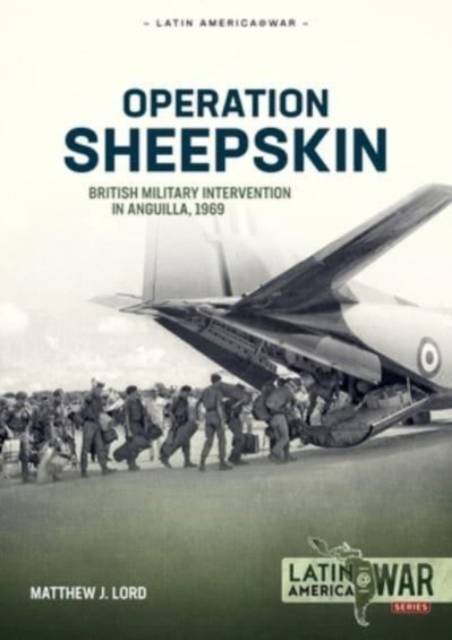
Je cadeautjes zeker op tijd in huis hebben voor de feestdagen? Kom langs in onze winkels en vind het perfecte geschenk!
- Afhalen na 1 uur in een winkel met voorraad
- Gratis thuislevering in België vanaf € 30
- Ruim aanbod met 7 miljoen producten
Je cadeautjes zeker op tijd in huis hebben voor de feestdagen? Kom langs in onze winkels en vind het perfecte geschenk!
- Afhalen na 1 uur in een winkel met voorraad
- Gratis thuislevering in België vanaf € 30
- Ruim aanbod met 7 miljoen producten
Zoeken
€ 27,95
+ 55 punten
Omschrijving
An in-depth military and political reappraisal of the Anguilla Crisis, exploring the countdown to military intervention, its tactical implementation and its legacy.
In the early morning darkness of 19 March 1969, troops from Britain's 2nd Battalion of the Parachute Regiment (2 PARA) and Royal Marines, clambered into the small landing craft and helicopters aboard HMS Minervaand HMS Rothesay. Their objective, under 'Operation Sheepskin', was to invade the small Caribbean island of Anguilla through both an amphibious and airborne assault. The operation aimed to crush a two-year island rebellion against the postcolonial government of Robert Bradshaw on St Kitts. Recent military intelligence reports had been patchy as to the level of resistance to be expected from the islanders; however, the number of firearms estimated to be on the island and the recent hostility experienced by British diplomats, suggested that the troops were about to encounter a storm of bullets as they hit the beaches.
Strangely enough, as the squaddies splashed ashore, they were met by the thunderous silence of an empty beach apart from the clicks of journalists' cameras. To the surprise of all involved, the occupation of the island was subsequently achieved without bloodshed. Whilst British policymakers soon questioned whether they had misread the situation in Anguilla and overreacted militarily, Fleet Street and the international media responded with ridicule. The operation was presented as a farce and emblematic of Britain's declining world role since the end of empire. This satirical interpretation has remained the abiding memory, if the invasion is remembered at all, within British public consciousness. Despite the military anti-climax however, this does not detract from the considerable importance of Operation Sheepskin for understanding the complexities of decolonization in the Caribbean; Britain's military performance following the retreat from 'East of Suez' and decision-making within the Labour government of Prime Minister Harold Wilson.
This book offers an in-depth military and political reappraisal of the Anguilla Crisis, exploring the countdown to military intervention, its tactical implementation and its legacy. In doing so, the book evaluates the reasons for the British government's apparent overreaction to the crisis, the scandal that rocked Whitehall as Operation Sheepskin was being arranged and finally, the series of operational blunders which emerged as the operation was carried out. Constituting a neglected and unusual chapter of post-war British military history, the book will appeal to those readers interested in the wars of decolonization, British politics in the 1960s and the history of the Caribbean at the end of empire.
In the early morning darkness of 19 March 1969, troops from Britain's 2nd Battalion of the Parachute Regiment (2 PARA) and Royal Marines, clambered into the small landing craft and helicopters aboard HMS Minervaand HMS Rothesay. Their objective, under 'Operation Sheepskin', was to invade the small Caribbean island of Anguilla through both an amphibious and airborne assault. The operation aimed to crush a two-year island rebellion against the postcolonial government of Robert Bradshaw on St Kitts. Recent military intelligence reports had been patchy as to the level of resistance to be expected from the islanders; however, the number of firearms estimated to be on the island and the recent hostility experienced by British diplomats, suggested that the troops were about to encounter a storm of bullets as they hit the beaches.
Strangely enough, as the squaddies splashed ashore, they were met by the thunderous silence of an empty beach apart from the clicks of journalists' cameras. To the surprise of all involved, the occupation of the island was subsequently achieved without bloodshed. Whilst British policymakers soon questioned whether they had misread the situation in Anguilla and overreacted militarily, Fleet Street and the international media responded with ridicule. The operation was presented as a farce and emblematic of Britain's declining world role since the end of empire. This satirical interpretation has remained the abiding memory, if the invasion is remembered at all, within British public consciousness. Despite the military anti-climax however, this does not detract from the considerable importance of Operation Sheepskin for understanding the complexities of decolonization in the Caribbean; Britain's military performance following the retreat from 'East of Suez' and decision-making within the Labour government of Prime Minister Harold Wilson.
This book offers an in-depth military and political reappraisal of the Anguilla Crisis, exploring the countdown to military intervention, its tactical implementation and its legacy. In doing so, the book evaluates the reasons for the British government's apparent overreaction to the crisis, the scandal that rocked Whitehall as Operation Sheepskin was being arranged and finally, the series of operational blunders which emerged as the operation was carried out. Constituting a neglected and unusual chapter of post-war British military history, the book will appeal to those readers interested in the wars of decolonization, British politics in the 1960s and the history of the Caribbean at the end of empire.
Specificaties
Betrokkenen
- Auteur(s):
- Uitgeverij:
Inhoud
- Aantal bladzijden:
- 86
- Taal:
- Engels
- Reeks:
Eigenschappen
- Productcode (EAN):
- 9781804513729
- Verschijningsdatum:
- 31/01/2024
- Uitvoering:
- Paperback
- Formaat:
- Trade paperback (VS)
- Afmetingen:
- 206 mm x 294 mm
- Gewicht:
- 317 g

Alleen bij Standaard Boekhandel
+ 55 punten op je klantenkaart van Standaard Boekhandel
Beoordelingen
We publiceren alleen reviews die voldoen aan de voorwaarden voor reviews. Bekijk onze voorwaarden voor reviews.









